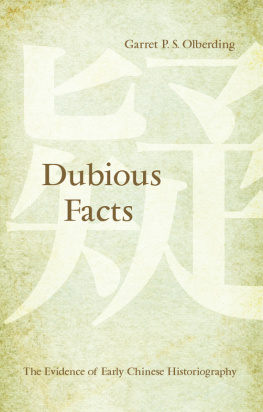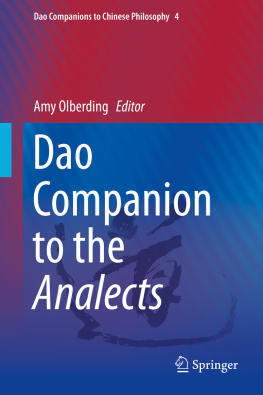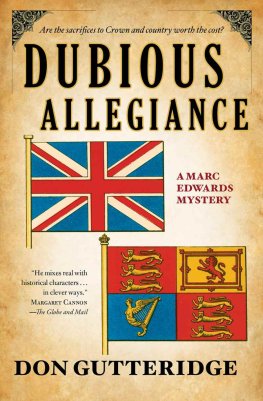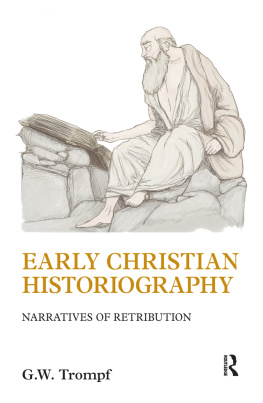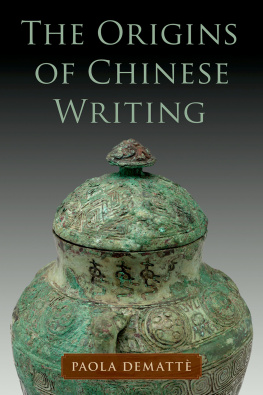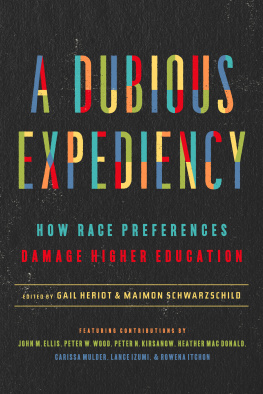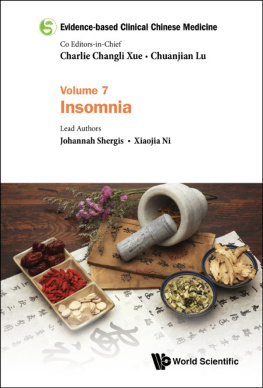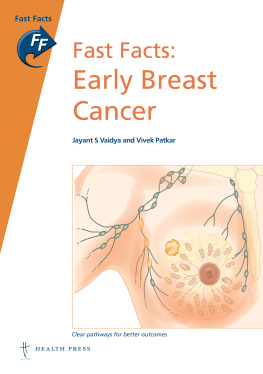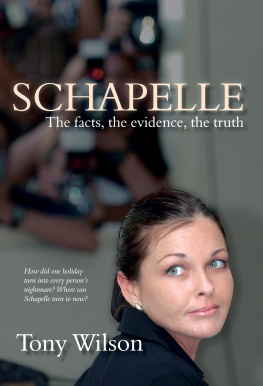Olberding - Dubious Facts: the Evidence of Early Chinese Historiography
Here you can read online Olberding - Dubious Facts: the Evidence of Early Chinese Historiography full text of the book (entire story) in english for free. Download pdf and epub, get meaning, cover and reviews about this ebook. City: New York;Albany, year: 2014;2012, publisher: State University of New York Press, genre: Religion. Description of the work, (preface) as well as reviews are available. Best literature library LitArk.com created for fans of good reading and offers a wide selection of genres:
Romance novel
Science fiction
Adventure
Detective
Science
History
Home and family
Prose
Art
Politics
Computer
Non-fiction
Religion
Business
Children
Humor
Choose a favorite category and find really read worthwhile books. Enjoy immersion in the world of imagination, feel the emotions of the characters or learn something new for yourself, make an fascinating discovery.
- Book:Dubious Facts: the Evidence of Early Chinese Historiography
- Author:
- Publisher:State University of New York Press
- Genre:
- Year:2014;2012
- City:New York;Albany
- Rating:3 / 5
- Favourites:Add to favourites
- Your mark:
- 60
- 1
- 2
- 3
- 4
- 5
Dubious Facts: the Evidence of Early Chinese Historiography: summary, description and annotation
We offer to read an annotation, description, summary or preface (depends on what the author of the book "Dubious Facts: the Evidence of Early Chinese Historiography" wrote himself). If you haven't found the necessary information about the book — write in the comments, we will try to find it.
Olberding: author's other books
Who wrote Dubious Facts: the Evidence of Early Chinese Historiography? Find out the surname, the name of the author of the book and a list of all author's works by series.
Dubious Facts: the Evidence of Early Chinese Historiography — read online for free the complete book (whole text) full work
Below is the text of the book, divided by pages. System saving the place of the last page read, allows you to conveniently read the book "Dubious Facts: the Evidence of Early Chinese Historiography" online for free, without having to search again every time where you left off. Put a bookmark, and you can go to the page where you finished reading at any time.
Font size:
Interval:
Bookmark:
SUNY SERIES IN CHINESE PHILOSOPHY AND CULTURE

Roger T. Ames, editor
Dubious Facts
The Evidence of Early Chinese Historiography
Garret P. S. Olberding

Published by
STATE UNIVERSITY OF NEW YORK PRESS
Albany
2012 State University of New York
All rights reserved
Printed in the United States of America
No part of this book may be used or reproduced in any manner whatsoever without written permission. No part of this book may be stored in a retrieval system or transmitted in any form or by any means including electronic, electrostatic, magnetic tape, mechanical, photocopying, recording, or otherwise without the prior permission in writing of the publisher.
For information, contact
State University of New York Press
www.sunypress.edu
Production, Diane Ganeles
Marketing, Anne M. Valentine
Library of Congress Cataloging-in-Publication Data
Olberding, Garret P. S.
Dubious facts : the evidence of early Chinese historiography / Garret P.S. Olberding.
p. cm. (SUNY series in Chinese philosophy and culture)
Includes bibliographical references and index.
ISBN 978-1-4384-4389-8 (hardcover : alk. paper)
1. ChinaHistoryTo 221 B.C.Historiography. I. Title.
DS741.25.O43 2012
931'.01dc23
2011047447
10 9 8 7 6 5 4 3 2 1
To Joe Gordon
who ever has faith
Acknowledgments
Many hands have stirred the pot of this work over the years it has been in the making. The members of my doctoral committee at the University of ChicagoDonald Harper, Edward Shaughnessy, and Danielle Allendeserve profound thanks for their incisive remarks, without which the flaws of the work would have been that much greater. But there are others, earlier influences, particularly those at the University of Hawaii, especially Roger Ames and Ron Bontekoe, who helped shape and form the ideas and questions I eventually would bring into some focus here. Sincere gratitude also must be offered to a number of scholars who, in spite of their own onerous workloads, gave me rich, detailed comments on various portions, including Rachel Barney, Philip J. Ivanhoe, Rivi Handler-Spitz, Justin Tiwald, David Schaberg, Michael Loewe, and, most especially, Michael Nylan, who astounded me by reading through completely, and offering detailed comments for, the early stages of the manuscript. I further wish to acknowledge the debt I owe the scholars who attended the workshop I hosted at the University of Oklahoma in March of 2009, with the generous support of a grant from the Chiang Ching-Kuo Foundation for International Scholarly Exchange. Whatever the strength of certain added portions of this manuscript is due to their critique. I am also very grateful for the steady assistance of Nancy Ellegate and Diane Ganeles of SUNY Press in bringing this book to print.
Lastly, there are those whose presence in my life and work go beyond any acknowledgment I could ever hope to compose. Amy Olberding, my wife and most supportive critic, has touched every aspect of my work, and, indeed, my life. I could not have written a word of this without her love and support. Adelein, our daughter, daily brings a joy I never thought I could have. But there is also one whose figure has accompanied me in spirit since I began my intellectual and personal journey into this at times very dark and forbidding forest. It is to him that this work is humbly dedicated.
An abbreviated earlier version of appears in Peter Lorge, ed., Debating Warfare in Chinese History (Leiden: Brill, 2012).
CHAPTER ONE
Introduction
Of the many problems surrounding the study of early Chinese historiography, one of the most troubling is the conspicuous tension between the narrator's moralizing commentary and the description of events. The earliest works of historiographysuch as the Book of Documents (Shangshu ), the Spring and Autumn Annals (Chunqiu ), and the seminal commentary to the Annals, Zuozhuan cannot be securely ascribed to a single author. Perhaps because of this, scholars often attribute the tension to the complex accretion of commentarial intrusions and editorial changes. By contrast, with the Han histories, with the Records of the Grand Historian (Shiji ) and the History of the Former Han (Hanshu ), there is the presumption of a dominant authorial voice, and with this authorial voice attends the assigning of a unitary authorial intent. Nevertheless, as in the earlier works, there often remain frustrating contradictions between moralizing commentaries and the specifics of the narrative. Consequently, as with the earlier works, the reader is often left to wonder what their authors' intentions actually were. Such concerns touch upon not only the ideological tensions between moral and narrative detail but also numerous tensions proceeding from various internal narrative contradictions, ironic voices, and complicated dramatic devices. Both the narrator and the historical characters at times appear to speak duplicitously, or at least disingenuously. Thus when interpreting the narratives, the discussions, the debates, and the references that comprise the material of the histories, we simply cannot take the speaker, whether narrator or character, at his word. This tendency toward vagueness and subtlety suffuses even some of the most outspokenly critical historical characters, particularly when their words are intended for submission to the court. Early Chinese historiography is a history frustratingly complicated by encoded speech.
Of course, encoded speech was vital to the monarchical circumstance. An anecdote about Emperor Yuan misunderstanding the meaning of his own orders illustrates its ubiquity:
At this time the emperor had just come to the throne and he did not realize that the phrase instruct the master of guests to summon them and turn them over to the commandant of justice meant that they were to be taken to prison, and he therefore approved the recommendation. Later, when he asked to have Chou K'an and Liu Kengsheng called into his presence, he was told, They are bound and in prison! Astounded at this information, he said, I thought they were only to be taken to the commandant of justice for questioning! and he began to berate [the Chief of Palace Writers] Hung Kung and [his assistant] Shih Hsien. The two knocked their heads on the floor in apology, after which the emperor said, See to it that they are released from prison and restored to their positions!
To interpret court speech successfully, the reader, like the monarch, is obliged to pay attention to the rhetorical undertones. Naturally, there can be unjustified and excessive interpretation of insinuation (as all too many traditional commentators of the Annals have engaged in), but a heightened awareness of insinuation is nevertheless important, particularly in the interpretation of the highly rhetoricized ministerial addresses. That ministers must rely upon muted insinuations is clearly reflected in the numerous recommendations by early Chinese thinkers about the need for extreme delicacy in the choice of language. Regarding the selection of illustrative examples, the Xunzi proclaims: Channel [examples] as if with canal ditches, force them as if with the press-frame, and accommodate them to the circumstances so that your audience will get hold of the idea under discussion, yet will not be given offense or be insulted. When directed toward political ends, court address had to be formulated carefully, both to avoid arousing the ire of the monarch and to address certain doubts that the speaker (or writer) presumes the monarch may have.
Font size:
Interval:
Bookmark:
Similar books «Dubious Facts: the Evidence of Early Chinese Historiography»
Look at similar books to Dubious Facts: the Evidence of Early Chinese Historiography. We have selected literature similar in name and meaning in the hope of providing readers with more options to find new, interesting, not yet read works.
Discussion, reviews of the book Dubious Facts: the Evidence of Early Chinese Historiography and just readers' own opinions. Leave your comments, write what you think about the work, its meaning or the main characters. Specify what exactly you liked and what you didn't like, and why you think so.

